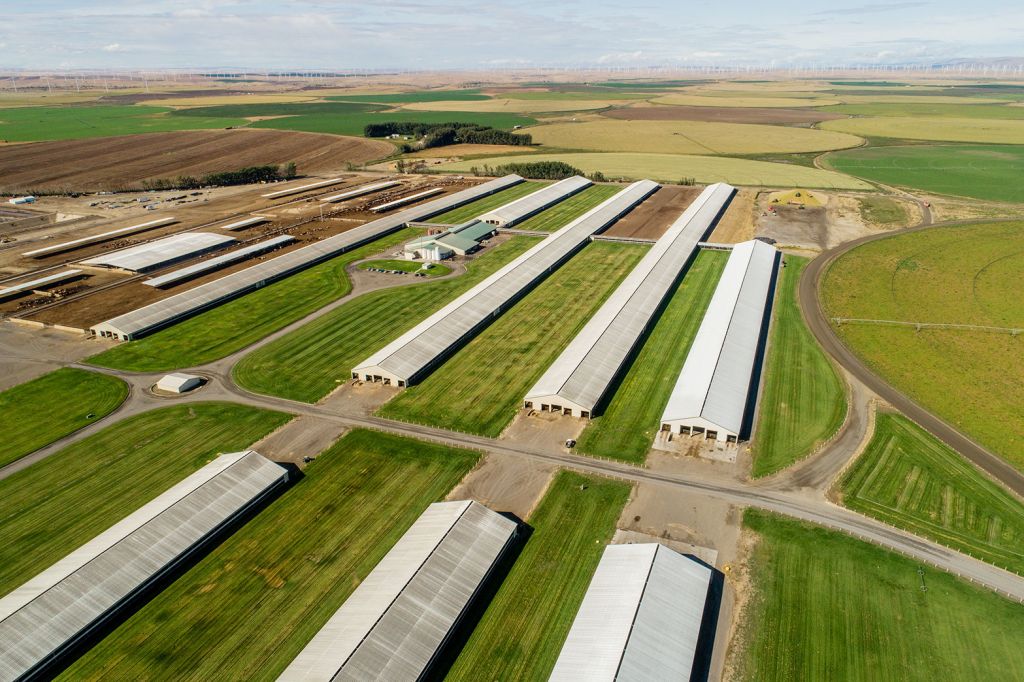Environmental group seeks to invalidate green energy credits for dairy digester
Published 12:00 pm Thursday, January 27, 2022

- The diversified farm at Threemile Canyon Farms near Boardman has 93,000 acres of cropland and open space.
An environmental group is asking California regulators to nullify green energy credits for biogas produced from dairy manure at Oregon’s Threemile Canyon Farms.
Food & Water Watch filed a complaint to the California Air Resources Board on Jan. 19, arguing that Threemile Canyon was generating lucrative credits possibly worth millions of dollars under the state’s Low Carbon Fuel Standard while at the same time committing air quality violations in Oregon.
Threemile Canyon is Oregon’s largest dairy with nearly 70,000 cattle — including 33,000 milking cows — along the Columbia River near Boardman. It is run by R.D. Offutt Co., a farming corporation headquartered in Fargo, N.D.
The farm built an anaerobic digester in 2012 to capture methane emissions from manure, which was initially used to generate electricity that was sold to the interstate utility PacifiCorp.
In 2019, Threemile Canyon installed $30 million of new equipment at the digester plant to convert methane into “pipeline quality” natural gas, tapping into California’s Low Carbon Fuel Standard, or LCFS.
Iogen Corp., a Canadian firm, markets the gas as a cleaner-burning fuel for trucks and buses on Los Angeles freeways.
Created in 2011 by the California Air Resources Board, the LCFS is a market-based incentive program specifically for the state’s transportation sector. Companies that produce lower-carbon fuels generate credits that can be sold to offset emissions from more carbon-intensive fossil fuels.
The LCFS is one of several measures under a 2006 California climate package that aims to reduce greenhouse gas emissions 20% by 2030 and 80% by 2050.
The board certified Threemile Canyon’s bio-methane production on Sept. 9, 2020, making it eligible to bank and sell LCFS credits.
However, Food & Water Watch — part of an environmental coalition called Stand Up to Factory Farms — is calling for a revocation of Threemile Canyon’s credits after the farm was fined by the Oregon Department of Environmental Quality for violating conditions of its air quality permit.
According to DEQ, Threemile Canyon used excess natural gas at the digester to dry leftover solid manure, which is recycled as animal bedding. The violations occurred from June 2019 to September 2020, for which the farm was fined $19,500.
Tyler Lobdell, staff attorney at Food & Water Watch, said companies that participate in the LCFS must comply with all environmental laws.
Even as CARB was reviewing Threemile Canyon’s LCFS application, Lobdell said the farm was using excess natural gas.
“Under these circumstances, CARB should have never granted Threemile’s LCFS application,” he said. “But the agency has the opportunity and obligation to correct that error now.”
Jennifer Maleitzke, a spokeswoman for R.D. Offutt, said Threemile Canyon takes environmental compliance seriously and corrected the situation immediately after being notified by DEQ in October 2020. The farm has paid the fine, she said.
Maleitzke said the complaint filed by Food & Water Watch ignores the fact that Threemile Canyon is turning a waste product into renewable energy. Renewable natural gas is considered carbon neutral and is fully compatible with the existing gas distribution infrastructure.
“We are proud to provide RNG as an alternative fuel for transportation vehicles and contribute to carbon reduction goals,” Maleitzke said. “The path of innovation isn’t perfect but it is necessary if we are to continue to meet the nutritional needs of our population as well as ensure the long-term sustainability of our planet.”
Stanley Young, communications director for CARB, said the agency is looking into the matter and will do its own fact-finding before taking any action.
At stake is a potentially valuable revenue stream for large dairies such as Threemile Canyon. The USDA Economic Research Service wrote in 2011 that, even with moderate carbon offset prices, the sale of credits could substantially increase revenue for farms with digesters.
For example, a dairy with at least 2,500 animals could generate $419 million in revenue over 15 years with credits valued at $13 per ton of carbon. That is about 46% of the total value of dairy digesters.
At $13 per ton, it would not be profitable for dairies with fewer than 250 head to adopt a digester, the researchers determined.





